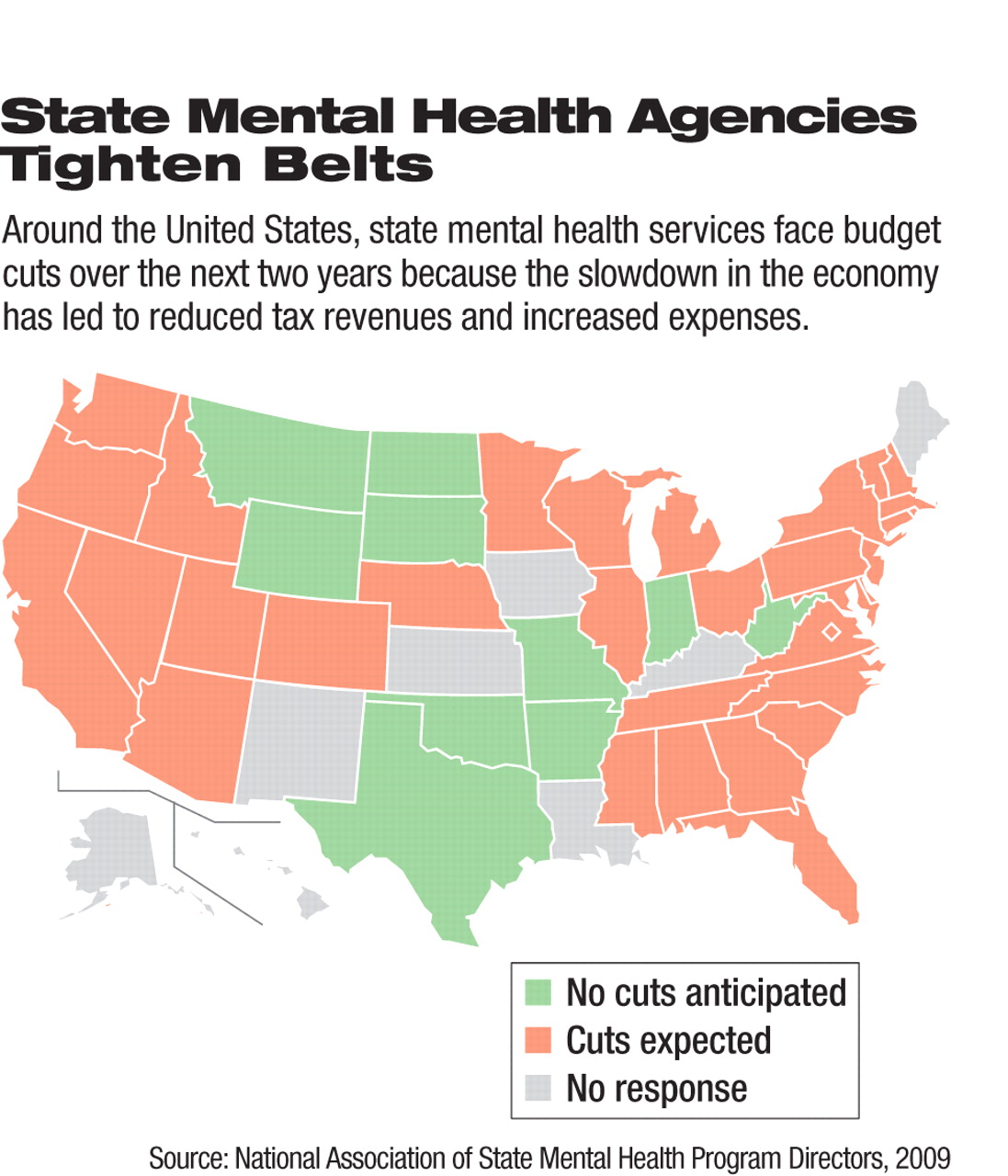Public mental health systems around the country are cutting or privatizing services as the recession bites deeper into state revenues.
At the end of the year, Massachusetts Gov. Deval Patrick (D) announced $9 million in cuts for the state's Department of Mental Health, including $8 million from adult day services and $1 million from social clubs that support people with mental illness.
Virginia Gov. Tim Kaine (D) proposed closing a mental health facility for children and adolescents in Staunton, an adolescent unit at the Southwestern Virginia Mental Health Institute in Marion, and a training center for the mentally disabled in Chesapeake as part of a plan to close a $2.9 billion state budget shortfall.
In Washington state, the Division of Alcohol and Substance Abuse and state Mental Health Division announced cuts to state-funded mental health and substance abuse services and programs.
“We're in the middle of an economic debacle that will probably continue into 2011,” said Michael Fitzpatrick, M.S.W., executive director of the National Alliance on Mental Illness (NAMI) and a former Maine state legislator. “It's not just government money or Medicaid. Philanthropic giving is down, and many clinics depend on lines of credit that have dried up.”
More than half of all states' mental health agencies have seen budget cuts in the current fiscal year and many expect them in the next one, according to a report from the National Association of State Mental Health Program Directors (NASMHPD). States are paying more in unemployment compensation while reduced consumer spending and falling real estate values are cutting tax revenues.
The NASMHPD report was based on survey responses from 42 states in November 2008. Ten states reported that they anticipated no cuts. The 32 state mental health agencies facing budget cuts this year reported that those declines would average 4.9 percent for Fiscal 2009, and they anticipated decreases of 8.2 percent in 2010 and 9.4 percent in 2011. Many states expect to face reductions in Medicaid as well.
Asked how they would cope with the budget cuts, the agencies said they would most likely implement hiring freezes, reduce administrative expenses, cut staff or services, or close state hospitals.
NAMI's Fitzpatrick doesn't hold out much hope that Washington will ride to the rescue.
“The economic problems won't be solved by the stimulus package because it won't fix the structural funding problems in the states,” he said.
Sometimes the cuts and privatization are driven by more than funding problems. Maryland is planning to shut down the only public inpatient mental health facility in the city of Baltimore and is trying to decide where to send the patients. While budgetary considerations apparently played some part in the decision, a local mental health official said other factors were involved as well.
The aging Walter P. Carter Center, located in downtown Baltimore near the University of Maryland's medical campus, houses primarily forensic patients, said Jane Plapinger, M.P.H., president and CEO of Baltimore Mental Health Systems, the local mental health authority.
“The Carter Center houses mostly forensic patients, who will be transferred to other state facilities, while the non-forensic patients will go to three general hospitals in the city with psychiatric units or to Sheppard Pratt Hospital,” said Plapinger in an interview. “The state will purchase care for them.”
Down the road from Baltimore, the District of Columbia announced plans to shift 4,300 clients of its public mental health services to private providers. That process is already underway—spurred by a court-appointed monitor before the budget crisis hit—but the endeavor is expected to save at least $11 million, said Steve Baron, L.C.S.W.-C., director of the District of Columbia Department of Mental Health, in an interview.
“About 2,500 clients will shift to private services by August, while 650 will remain in government-operated care,” said Baron. The latter include mainly non-English-speaking, deaf, dual-diagnosis, or court-involved patients. The agency's 16 psychiatrists will remain on staff to oversee and manage care for the patients moved to private care.
The department will create 12 continuity-of-care teams, each consisting of one consumer and one staff person, to follow patients, get them enrolled with private providers, and make sure they keep appointments.
The shift to privatization has some public-sector employees in D.C. and elsewhere worried about their futures, but one psychiatrist at a private, nonprofit clinic doesn't mind.
“I don't think it's a bad thing at all,” said Carl Bell, M.D., president and CEO of Community Mental Health Council and Foundation Inc. and a clinical professor of psychiatry and public health at the University of Illinois at Chicago. “City clinics are burdened with unions, patronage, seniority, and fixed-benefit pensions. Private comprehensive mental health centers can be more flexible and innovative and offer more services.”
Municipal health departments should be doing public health, not tertiary care, said Bell, who is chair of APA's Council on Social Issues and Public Psychiatry.
Despite the cuts, state mental health agencies will remain an essential part of psychiatric care in the United States, and the entire system will feel the difference if it is seriously diminished, said NAMI's Fitzpatrick.
When states cut staff, the public system loses capacity and cases back up, and untreated mentally ill persons end up in shelters or jails, he said.
“You end up with shells of services,” he said. “Our concern is that the economy is hurting this fragile system.” ▪

